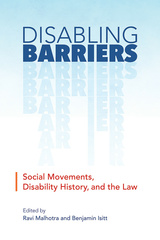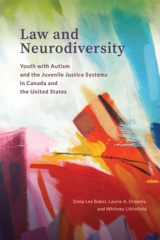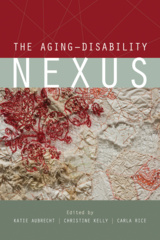
Disability Injustice
Confronting Criminalization in Canada
Ableism is embedded in Canadian criminal justice institutions, policies, and practices, making incarceration and institutionalization dangerous – even deadly – for disabled people. Disability Injustice brings together highly original work by a range of scholars and activists to explore disability in the historical and contemporary Canadian criminal justice system.
The contributors confront challenging topics such as eugenics and crime control; the pathologizing of difference as deviance within criminal law systems; processes of criminalization based on discretionary, biased approaches to physical and mental health; and the role of disability justice activism in contesting longstanding discrimination and exclusion. Weaving together disability and sociolegal studies, criminology, and law, they examine disability in relation to various agencies and aspects of the criminal justice system. Policing and surveillance, sentencing and the courts, prisons and other carceral spaces, and alternatives to confinement are among the areas of focus.
Drawing on empirical data and new theoretical insights, Disability Injustice investigates how disability intersects with race, class, gender, and sexuality to perpetuate oppression, paying particular attention to ways forward. This provocative collection highlights how, with deeper understanding of disability, we can and should challenge the practices of crime control and the processes of criminalization.
This crucial work will interest not only scholars of disability studies, criminology, law, and sociology but also advocates and activists involved in disability justice work in Canada.
This book brings together interdisciplinary and diverse work from across Canada – from jury selection and everyday surveillance to the policing of the sexuality of people with disabilities outside of the legal system. It is a fantastic accomplishment!
Disability Injustice is an important and long-overdue book on the complex relationship between disability and carceral systems in Canada. The history of policing and punishing disabled bodies and minds is pervasive and disturbing, and this work provides important insights into the theory, practice, and persistence of ableism the justice system.
Kelly Fritsch is an assistant professor in the Department of Sociology and Anthropology at Carleton University. She is the co-author, with Anne McGuire, of We Move Together, a children’s book about disability justice. Jeffrey Monaghan is an associate professor in the Institute of Criminology and Criminal Justice at Carleton University. He is the co-author, with Andrew Crosby, of Policing Indigenous Movements: Dissent and the Security States and currently serves on the editorial board of the multidisciplinary journal Criminological Encounters. Emily van der Meulen is a professor in the Department of Criminology at Ryerson University. She is a co-editor of several books, including Red Light Labour: Sex Work Regulation, Agency, and Resistance, with Elya M. Durisin and Chris Bruckert.
Contributors: Liat Ben-Moshe, Emmanuelle Bernheim, Michelle Bertrand, Lindsay Blewett, Abigail Curlew, Vèronique Fortin, Kelly Fritsch, Stèphanie Houde, Richard Jochelson, Lisandre Labrecque-Lebeau, Sue-Ann MacDonald, Ravi Malhotra, Alexander McClelland, Jeffrey Monaghan, Alok Mukherjee, Guillaume Ouellet, Pierre Pariseau-Legault, Theresa Raymond, River Rossi, Megan A. Rusciano, and Emily van der Meulen.
1 Resisting the Criminalization of Disability: Cripping Disability Injustice toward Accessible Decarceral Futures / Kelly Fritsch, Jeffrey Monaghan, and Emily van der Meulen
Part 1: Practices and Processes of Criminalization
2 From Prisoner to Patient: Mental Health and Toronto’s Andrew Mercer Reformatory for Females, 1880–1969 / Theresa L. Raymond
3 Histories of Living in a Negative Relation to the Law: Resistance to HIV Criminalization / Alexander McClelland
4 The Criminalization of Sex Work: Creating Conditions for Disability / Lindsay Blewett
5 The Judicialization of Everyday Life in Quebec: Intellectual Disability, Sexuality, and Control / Guillaume Ouellet, Lisandre Labrecque-Lebeau, Pierre Pariseau-Legault, and Emmanuelle Bernheim
Part 2: The Criminal (In)Justice System
6 Police Encounters with “People in Crisis”: Mental Health and Policing / Alok Mukherjee
7 Therapeutic Justice or Epistemic Injustice? The Case of Mental Health Courts in Québec / Sue-Ann MacDonald, Véronique Fortin, and Stéphanie Houde
8 Conceptualizing Jury Representation: Research on Physical Disability and the “Larger Community” in Canadian Jury Rolls / Richard Jochelson and Michelle Bertrand
9 Punishing Disability and Trauma: Evaluating the Use of Segregation in Canadian Prisons / Megan Rusciano
Part 3: Reconceptualizing Disability and Reframing Justice
10 Disability, Politics, and Collectively Reimagining Justice: Challenging the Ableist Contours of the 1969 Canadian Criminal Code Reform / River Rossi
11 The Politics of Death-Making/Assisted Suicide: A Castoriadan Reading / Ravi Malhotra
12 #Endpoliceviolence: Nonhegemonic Bodies, Police Violence, and Abolitionist Politics / Abigail Curlew and Jeffrey Monaghan
13 Refuting Carceral Logics and their Alternatives: Toward Noncarceral (Disability) Futures / Liat Ben-Moshe
Index













